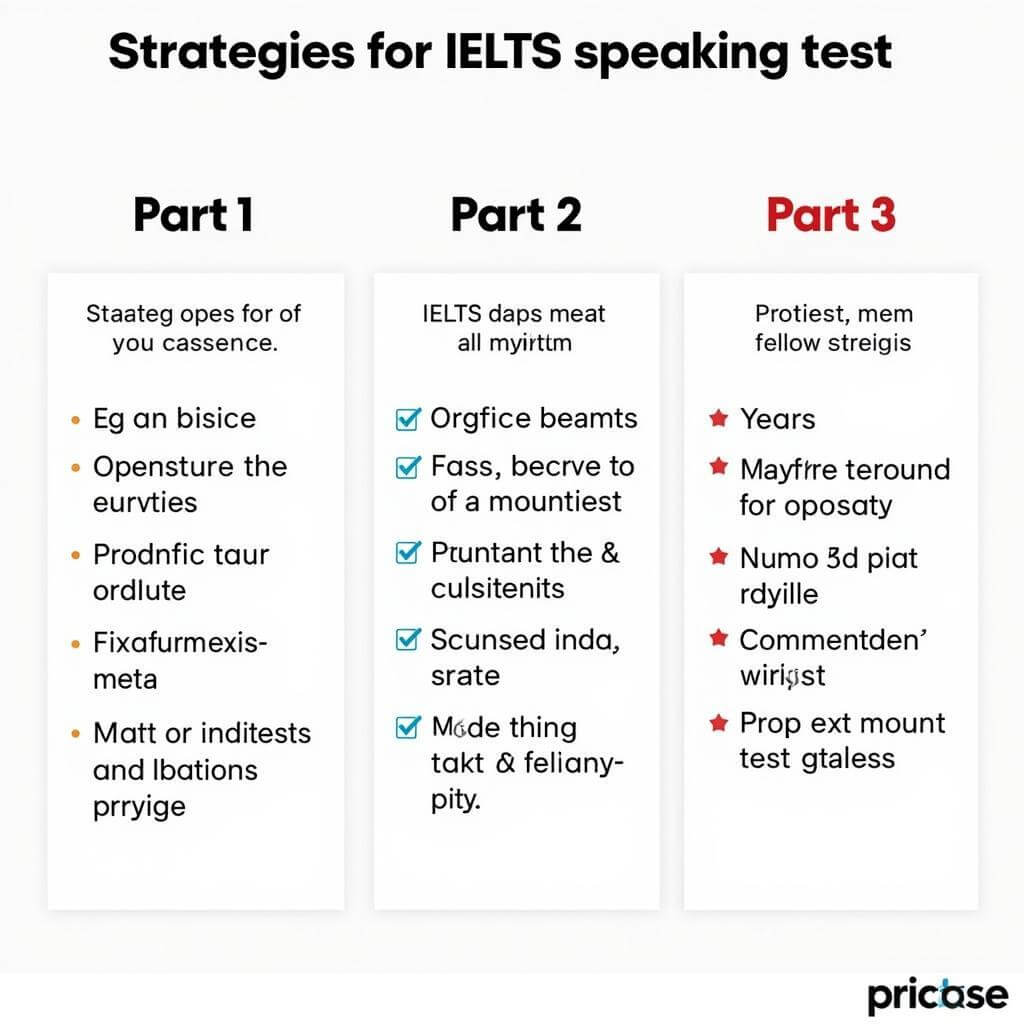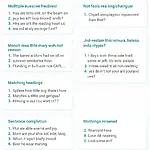Time pressure is a common challenge in the IELTS Speaking test, often causing anxiety and impacting performance. Developing strategies to speak confidently and coherently under these conditions is crucial for success. This article explores practical techniques to help you excel in the IELTS Speaking test, even when time is tight.
Understanding the Time Constraints in IELTS Speaking
Before diving into strategies, it’s essential to understand the time structure of the IELTS Speaking test:
- Part 1: 4-5 minutes of general questions
- Part 2: 1 minute preparation, 2 minutes speaking
- Part 3: 4-5 minutes of more abstract questions
Knowing this structure helps you prepare mentally and manage your time effectively during the test.
Key Strategies for Speaking Under Time Pressure
1. Improve Your Fluency
Improving fluency for IELTS speaking is crucial when time is limited. Practice speaking continuously without long pauses or hesitations. Here are some techniques:
- Use fillers wisely (e.g., “Well,” “You see,” “In my opinion”)
- Employ circumlocution when you can’t find the exact word
- Practice linking words and phrases for smooth transitions
2. Prioritize Content Over Perfection
When time is short, focus on conveying your main ideas rather than striving for perfect grammar or vocabulary. Dr. Emily Thompson, an IELTS expert with 15 years of experience, advises:
“In time-pressured situations, it’s more important to express your thoughts clearly than to use complex language. Prioritize getting your point across effectively.”
3. Develop a Quick-Response Framework
Create a mental framework for structuring your responses quickly:
- Main idea
- Supporting point
- Example or personal experience
- Brief conclusion or restatement
This structure helps you organize thoughts rapidly and speak more coherently under pressure.
4. Practice Timed Speaking Exercises
Regular timed practice is essential for building confidence and speed. Try these exercises:
- Use IELTS Speaking Part 2 cue cards and time yourself for 1-minute preparation and 2-minute speaking
- Record yourself answering random questions for 1-2 minutes without stopping
- Practice with a study partner, taking turns to ask and answer questions within time limits
5. Enhance Your Vocabulary Recall
Quick vocabulary recall is crucial when speaking under pressure. To improve:
- Create topic-based word lists and review them regularly
- Practice using new words in sentences immediately after learning them
- Play word association games to improve mental agility
Improving retention of important passages can also help you quickly access relevant vocabulary during the test.
6. Master the Art of Concision
Being concise is vital when time is limited. Here’s how to express yourself more efficiently:
- Use strong, specific verbs instead of verb phrases
- Avoid unnecessary repetition
- Practice summarizing complex ideas in simple terms
IELTS Speaking coach Sarah Miller emphasizes:
“Learning to be concise without losing substance is a game-changer in IELTS Speaking. It allows you to say more in less time, which is invaluable under pressure.”
7. Develop Strategies for Each Speaking Part
Tailor your approach to each part of the IELTS Speaking test:
Part 1:
- Give brief, direct answers
- Elaborate slightly on one or two questions to show range
Part 2:
- Use your 1-minute preparation time effectively
- Jot down key points as a speaking outline
Part 3:
- Listen carefully to questions and ask for clarification if needed
- Start with a clear stance or opinion before elaborating
 IELTS Speaking Part Strategies
IELTS Speaking Part Strategies
8. Manage Stress and Anxiety
Speaking under time pressure can be stressful. Try these techniques to stay calm:
- Practice deep breathing exercises before and during the test
- Use positive self-talk to boost confidence
- Visualize successful speaking scenarios
Avoiding grammar mistakes in timed tasks can also help reduce anxiety by increasing your confidence in your language skills.
9. Improve Spontaneity in Your Responses
Enhancing your ability to think on your feet is crucial for time-pressured speaking. To improve:
- Engage in impromptu speaking activities regularly
- Practice debating or discussing random topics with friends
- Challenge yourself to give instant responses to unexpected questions
Improving coherence in spontaneous answers will help you maintain logical flow even when speaking off-the-cuff.
Conclusion
Mastering the art of speaking under time pressure is a key skill for IELTS success. By implementing these strategies and practicing regularly, you can significantly improve your performance in the Speaking test. Remember, the goal is not perfection but effective communication within the given time constraints. With consistent practice and the right techniques, you can confidently tackle the IELTS Speaking test, even under pressure.
How to prepare for IELTS with limited time offers additional tips for those facing time constraints in their overall IELTS preparation.
FAQs About Strategies for Speaking Under Time Pressure in IELTS
-
How can I avoid running out of things to say during the 2-minute talk in Part 2?
Prepare a mental outline using the cue card prompts. Practice expanding on each point and include a personal example or anecdote to fill the time effectively. -
What should I do if I can’t understand a question in Part 3?
Don’t hesitate to ask for clarification. It’s better to understand the question fully than to give an off-topic answer. You can say, “Could you please rephrase the question?” or “I’m not sure I understood. Are you asking about…?” -
Is it okay to use fillers like “um” and “uh” when I’m thinking?
While it’s natural to use some fillers, try to minimize them. Instead, use more sophisticated fillers like “Well, let me think about that” or “That’s an interesting question” to buy thinking time. -
How can I improve my speaking speed without sacrificing clarity?
Practice tongue twisters and read aloud regularly to improve your articulation. Focus on enunciating clearly rather than speaking faster. Natural speed will come with increased confidence and fluency. -
What if I realize I’ve made a mistake while speaking? Should I correct myself?
If it’s a minor mistake that doesn’t affect meaning, it’s often better to continue speaking. For significant errors, you can briefly correct yourself and move on. Avoid dwelling on mistakes as it can disrupt your flow and confidence.


